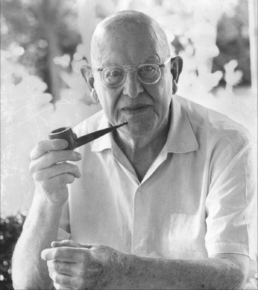These life stories may contain descriptions of childhood trauma and abuse, as well as images, voices and names of people now deceased. If you need help, you can find contact details for some relevant support services on our support page.
Widely read 20th century English writer, P.G. Wodehouse (1881-1975), was in foster and kinship care as a child.
P.G. Wodehouse was born in Surrey, England into an aristocratic family. He was named Pelham Grenville but family and friends called him ‘Plum’, repeating the boy’s early attempts at pronouncing his name.
According to biographer Barry Phelps:
P.G. Wodehouse was, for all practical purposes, an orphan. Between the ages of two and a half and fifteen he saw his parents for scarcely six months (Phelps, 38).
Plum’s father, Ernest Wodehouse, a magistrate, went to Hong Kong to work from 1867. It was there he met and married Plum’s mother, Eleanor Deane, ten years later.
In 1883, Eleanor, who was on a visit back to England when Plum was born, took her three children (six-year-old Peveril, four-year-old Armine and two-year-old Plum), rented a house in Bath, and left the children with a Miss Roper while she went back to Hong Kong. Miss Roper was called a governess but acted in the role of a foster parent to the children.
Three years later, in 1886, Eleanor returned to England with Ernest who was to receive an award from Queen Victoria for his work in Hong Kong. The couple moved their children “to a dame school in Croydon run by the Misses Prince, Florrie and Cissie” where they boarded until they were sent to board at “Elizabeth College, a small public school in Guernsey.” Thereafter the boys were separated briefly and Plum was sent to board at Malvern House until he joined Armine at Dulwich College.
During those eleven years between 1883 and 1894, the three Wodehouse brothers led a peripatetic existence. Wodehouse told Jasen:
You know, they sort of shoved us off on to various aunts for the holidays. I never knew any of them at all (Phelps, 38).
Says another biographer, Robert McCrum (14):
From the day he was born [he was cared for in Hong Kong by a Chinese nanny], Wodehouse’s parents were at best remote, at worst utterly foreign. There are extraordinarily few mothers and fathers in his writing. Parents are usually portrayed as cold and aloof, and their attitude towards children, in his fiction, is generally stern, not loving. The lack of feeling is mutual. When Wodehouse writes, of Lord Emsworth’s son, that ‘The last thing in the world which the Hon. Freddie wanted was to see his parent’, the gulf of emotion reflects his own experience.
As a young man of twenty, in 1902 Wodehouse decided to ditch his job in a bank and take up freelance writing. He had a spot as a “humorous columnist on the London Globe” to get him started and then sold pieces to many other publications. In 1913, Wodehouse turned to writing farce, and this became his particular talent.
Whatever the dates of publication of his books, Wodehouse’s English social atmosphere is of the late Edwardian era. The young bachelor Bertie Wooster and his effortlessly superior manservant, Jeeves, were still together, their ages unadvanced, in Much Obliged, Jeeves (1971), though they first appeared in a story in The Man with Two Left Feet (1917) (Britannica).
Wodehouse was living in France and interned by the Nazis as an enemy alien. When he was released, he was taken to Berlin and tricked into making broadcasts on German radio to the Allies. He was subsequently cleared of any collaboration with the Nazis by MI5.
After the war, Wodehouse made his home in the United States, becoming a US citizen in 1955 and never returning to England.
P.G. Wodehouse was the author of almost one hundred books. He was knighted in 1975, only a month before his death. In 2018 it was announced that Westminster Abbey planned to dedicate a memorial to the writer; the memorial was unveiled on 20 September 2019.
References:
McCrum, Robert. Wodehouse. A Life. London: Viking, 2004.
P.G. Wodehouse. Writer, Playwright and Novelist. Westminster Abbey. https://www.westminster-abbey.org/abbey-commemorations/commemorations/pgwodehouse
Phelps, Barry. P.G. Wodehouse. Man and Myth. London: Constable, 1992.
“Sir P.G. Wodehouse British Author”. Britannica. https://www.britannica.com/biography/P-G-Wodehouse
Image available here.
